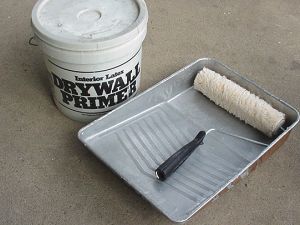|
The short answer is yes. Don't just buy an extra gallon of cheap paint to
act as the primer. On new construction, drywall compound absorbs paint at a
different rate than the papered surface. Primer evens out the porosity of the
surface and gives a nice, uniform sheen to the topcoat. If used over existing
paint, primer can block stains, help hold new paint to glossy surfaces or hide
imperfections. There are also primers for use on siding and metal surfaces.
Make sure that the type of primer you buy is compatible with paint you are
using. Always check the label.
There are many different types of primers and can help you in many different
ways:
Generic - Usually intended for use on new construction. Evens out the
porosity of the surface to provide a nice even sheen to the top coat.
Stain-Blocking - certain types of stains will bleed through new layers of
paint. Stain-blocking primers prevent the stain from working its way up through
the paint. Rust, tar and crayon stains are good examples. If you are using
this over mildew, kill the mildew first and ask for a mildew-resistant
formulation at the paint store.
High-build - No wall is perfect. High-build primers build the thickness of
the paint coat quickly. This helps hide imperfections in drywall work. Sanding
into joint tape is a common mistake, this type of primer helps to hide it.
"Bonders" - These primers are intended for use on glossy surfaces such as
gloss, semi-gloss and lacquer finishes. They help hold the next layer of paint
on.
Here are some links:
Sherwin-Williams
KILZ
|

Drywall primer
|



